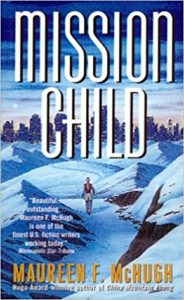This was a good year for reading. No household relocations, no major changes on the job front, no international incidents. That adds up to a longer list of books (somewhat eclectically defined) read than any year since I began keeping these lists.
Voting for the Hugo award drove a lot of my reading in the middle of the year. It definitely increased the amount of what I read, and this list does not include all the works in various categories — fanzine, graphic story — that I read as part of making my choices. My choices were interestingly at odds with other voters. I would have given the award to N.K. Jemisin for her short story, rather than for The Obelisk Gate. The novella I liked best placed fifth in voting, while the novelette I liked best was the one that won. The other voters shared my enthusiasm for Words Are My Matter by Ursula K. Le Guin. All in all, being a Hugo voter was a rewarding experience, quite apart from the great joy that was the Worldcon itself. I hope to do it again in 2019 for Dublin, an Irish Worldcon.
Hugo reading was just part of a good year for authors who are new to me, although it brought several to my attention: Yoon Ha Lee, Becky Chambers, Kai Ashante Wilson, Kij Johnson, Victor LaValle. Beyond the Hugo finalists, authors whose work was new to me and left me wanting more include Ben H. Winters and Andrey Platonov.
Communist legacies turned up in a fair amount of this year’s reading, architecturally with Landscapes of Communism and Soviet Bus Stops, directly with Lenin on the Train, Conversations with Stalin, The Last Man in Russia and Revolutionary Russia, fictionally in The Foundation Pit, and as part of the big picture in Postwar, The Ottoman Endgame, and Germany: Memories of a Nation.
This year past, I read four books in German, eight graphic works, ten Discworld books, one Shakespeare play, and three books in translation (one from Russian, one from Polish, and one from Serbo-Croatian). I am fairly certain that I read I, Robot many years ago, so I re-read one book in 2017. (ETA: Whoops, I have read Macbeth numerous times. I just overlooked it in the list when I put this overview together. So that makes two.)
The non-fiction book I am most likely to read again is We Were Eight Years in Power by Ta-Nehisi Coates. The non-fiction book with the most passages flagged for the review I am still working on is What Happened by Hillary Rodham Clinton, even if it is missing two words from its title. The fiction that has stayed with me the most includes Underground Airlines, The Foundation Pit, and A Taste of Honey. At least two of those three are about terribly repressive societies. Sign of the times?
Best book expressing a view about brass instruments goes to A Devil to Play by Jasper Rees. Best cover belongs to Lenin on the Train. Best scene whose outcome you already know is the one with the crossbow and the apple in Wilhelm Tell. Best geeking out on an obscure topic has to be China Among Equals. Best book with the word “fifth” in the title was The Fifth Elephant, although the best Discworld book was The Truth, even though the best single scene in a Discworld book was very likely the opening of Carpe Jugulum, with Granny Weatherwax called in to assist a midwife at an emergency birth.
Full list, roughly in order read, is under the fold with links to my reviews and other writing about the authors here at Frumious.
Continue reading


